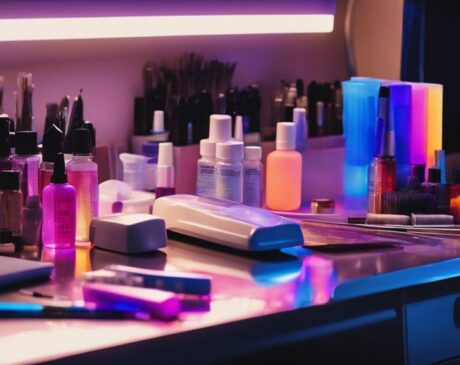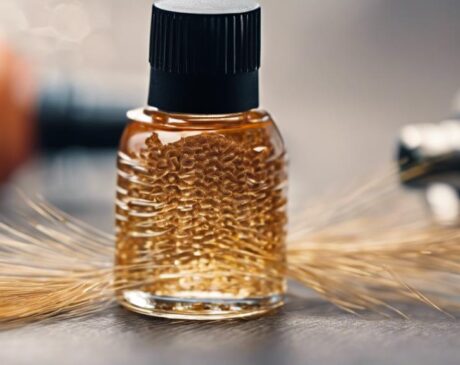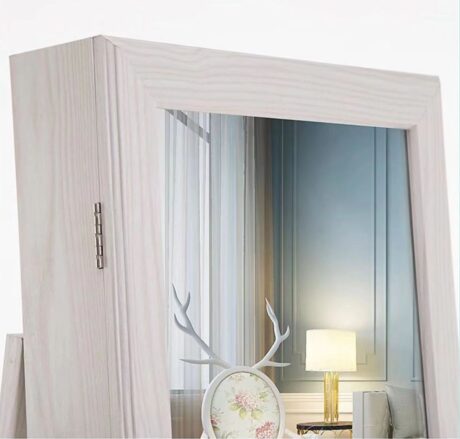What Is Liquid Nails Best Used For?

Liquid Nails is best used for various applications such as tile and baseboard installations, securing countertops, and mounting mirrors. It provides a strong and durable bond ideal for home improvement projects. This versatile adhesive eliminates the need for nails and is resistant to moisture, temperature changes, and vibrations, ensuring a secure placement. Whether you're repairing loose tiles in bathrooms, attaching baseboards in living rooms, or installing drywall in garages, Liquid Nails offers lasting stability and durability. For a reliable and efficient bond, Liquid Nails is the go-to choice for your construction needs.
Key Takeaways
- Ideal for tile, baseboard, and trim installations, eliminating the need for nails.
- Versatile adhesive for repairing loose tiles, broken ceramics, and damaged wood.
- Strong bond and water resistance for kitchen and bathroom applications.
- Suitable for outdoor projects, withstanding exposure to weather elements.
- Enhances acoustics in wall cavities and perfect for specialty applications like trim installations.
Repairing Loose Tiles in Bathrooms

To effectively repair loose tiles in bathrooms, applying Liquid Nails adhesive proves to be a reliable solution. This innovative adhesive offers a strong bond that ensures the tiles remain securely in place for an extended period. Liquid Nails, known for its versatility and durability, provides a quick and easy fix for loose tiles without the need for extensive renovation.
The application process is straightforward and efficient, making it a popular choice among DIY enthusiasts and professionals alike. Simply apply a small amount of Liquid Nails to the back of the loose tile and press it firmly onto the wall or floor. The adhesive sets quickly, allowing for a fast repair that minimizes downtime and inconvenience.
In addition to its adhesive properties, Liquid Nails also offers excellent water resistance, making it ideal for use in bathrooms where tiles are frequently exposed to moisture. This feature ensures that the repaired tiles maintain their integrity even in high humidity environments. Overall, Liquid Nails proves to be a valuable solution for repairing loose tiles in bathrooms, providing a reliable and long-lasting fix that meets the demands of modern homeowners.
Attaching Baseboards in Living Rooms
When it comes to attaching baseboards in living rooms, using Liquid Nails can provide a strong and durable bond. The benefits of using Liquid Nails for baseboard installation include its adhesive strength and resistance to temperature changes. Applying Liquid Nails in living rooms ensures a reliable attachment that can withstand daily wear and tear.
Baseboard Attachment Tips
For a secure and visually appealing baseboard attachment in living rooms, ensuring proper alignment and measuring accuracy is essential. To achieve this, consider the following tips:
- Precision Cutting: Use a miter saw for accurate cuts at corners.
- Seamless Joints: Utilize coping techniques for seamless joint connections.
- Wall Preparation: Clean and sand the walls for better adhesive bonding.
- Adhesive Application: Apply Liquid Nails in a zigzag pattern for optimal adhesion.
Liquid Nails Benefits
Liquid Nails offers significant advantages when attaching baseboards in living rooms due to its strong adhesive properties and reliable bonding capabilities. When used for securing baseboards, Liquid Nails provides a durable and long-lasting hold, ensuring that the baseboards remain firmly in place over time. The innovative formula of Liquid Nails allows for easy application, reducing the need for nails or screws that can damage the baseboards or walls. This advanced adhesive not only creates a strong bond between the baseboards and the wall but also helps to reduce noise and vibration, resulting in a more stable and quieter living environment. Overall, Liquid Nails proves to be a superior choice for attaching baseboards in living rooms, offering unmatched performance and durability.
Living Room Application
In the context of home improvement projects, particularly in living room renovations, the application of Liquid Nails for attaching baseboards stands out as a reliable and efficient method. Liquid Nails provides a strong bond that helps secure baseboards to various surfaces, enhancing the overall aesthetics of the living space. This innovative adhesive offers several advantages, including:
- No More Nail Holes: Liquid Nails eliminates the need for nails, preventing unsightly holes in the baseboards.
- Quick Application: Its fast-drying formula allows for efficient installation, saving time during the renovation process.
- Versatile Adhesion: Works well on multiple surfaces such as wood, drywall, and concrete, providing flexibility in design options.
- Durable Hold: Creates a long-lasting bond that helps maintain the integrity of the baseboards over time.
Securing Countertops in Kitchens
When securing countertops in kitchens, proper installation is crucial for both aesthetics and functionality. Utilizing Liquid Nails provides a strong bond between the countertop and the base, ensuring durability and stability. The benefits of using Liquid Nails for this task include ease of application and resistance to moisture, making it an ideal choice for kitchen countertop installations.
Kitchen Countertop Installation
Securing kitchen countertops effectively is crucial for ensuring their stability and longevity in a busy cooking environment. To achieve this, Liquid Nails proves to be a reliable adhesive choice for installing kitchen countertops. Its innovative formula provides strong bonding capabilities that can withstand the demands of daily kitchen activities. When using Liquid Nails for kitchen countertop installation, consider the following:
- Waterproof Properties: Liquid Nails offers water-resistant properties, making it ideal for kitchen environments prone to spills and moisture.
- Quick Drying Time: Its fast-drying feature allows for efficient countertop installation, reducing downtime in the kitchen.
- High Strength: The adhesive's high-strength formula ensures a durable bond that can support the weight and usage associated with kitchen countertops.
- Versatile Application: Liquid Nails can be applied to various countertop materials, offering flexibility in design choices.
Benefits of Using
For installations requiring reliable and durable adhesive solutions in kitchen environments, the benefits of using Liquid Nails for securing countertops extend beyond just stability to encompass long-term performance and efficiency. Liquid Nails provides a strong bond that can withstand the daily wear and tear of a busy kitchen, ensuring that countertops remain securely in place for years to come. Additionally, its advanced formula offers resistance to moisture, heat, and vibrations, making it ideal for kitchen settings where these factors are prevalent. The table below highlights key benefits of using Liquid Nails for securing countertops in kitchens:
| Benefits of Using Liquid Nails for Countertops | Description |
|---|---|
| Strong Bond | Ensures countertops stay securely attached |
| Moisture Resistance | Guards against water damage |
| Heat and Vibration Resistance | Maintains stability in varying conditions |
Installing Drywall in Garages

To effectively insulate and finish the interior of a garage, installing drywall is a crucial step in the process. Drywall not only provides a clean and polished look but also helps with soundproofing and insulating the space. Here are some innovative ways to enhance the installation process:
- Use Green Glue: Incorporating Green Glue soundproofing compound between two layers of drywall can significantly reduce noise transmission, making the garage a more peaceful environment.
- Install Moisture-Resistant Drywall: Opt for moisture-resistant drywall in garages to prevent mold and mildew growth in areas prone to high humidity levels.
- Consider Soundproof Insulation: Adding soundproof insulation within the wall cavities before installing drywall can further enhance the acoustic properties of the garage.
- Utilize Metal Studs: Metal studs are a durable and innovative alternative to wood studs, providing a sturdy framework for the drywall while being resistant to warping or mold growth.
Bonding Trim Pieces in Bedrooms
When enhancing the aesthetic appeal of bedrooms, one effective method involves utilizing Liquid Nails for bonding trim pieces seamlessly and securely to walls and surfaces. Liquid Nails provides a reliable and durable bond that ensures the trim pieces stay in place for a long time. In bedrooms, where style and elegance are paramount, using Liquid Nails to attach trim pieces such as baseboards, crown molding, chair rails, or wainscoting can elevate the overall look of the room. The adhesive properties of Liquid Nails allow for a strong connection between the trim pieces and the walls, creating clean lines and a polished finish. Additionally, Liquid Nails' fast-drying formula means less waiting time, enabling quick progress on bedroom renovation projects. Whether you are a DIY enthusiast or a professional contractor, incorporating Liquid Nails for bonding trim pieces in bedrooms can streamline the installation process and result in a sophisticated and cohesive design that transforms the space into a stylish sanctuary.
Mounting Mirrors in Bathrooms

Enhancing bathroom decor with mirrors involves utilizing Liquid Nails for secure and lasting installations that add both functionality and style to the space. Mounting mirrors in bathrooms can be a straightforward task when using Liquid Nails to ensure a strong bond that withstands moisture and humidity. Here are some key considerations for using Liquid Nails to mount mirrors in bathrooms:
- Water-resistant formula: Liquid Nails offer a water-resistant formula that is ideal for bathroom environments, preventing the mirror from detaching due to moisture exposure.
- Strong adhesion: The adhesive properties of Liquid Nails provide a strong and durable bond, keeping the mirror securely in place even in high-traffic areas.
- Versatile application: Liquid Nails can be applied to various surfaces, including drywall, concrete, and wood, making it suitable for different types of bathroom walls.
- Quick-drying: With a quick-drying time, Liquid Nails facilitate efficient installation of mirrors, allowing you to enhance your bathroom decor without extended wait times.
Frequently Asked Questions
Can Liquid Nails Be Used Outdoors for Projects Like Attaching Outdoor Trim or Securing Outdoor Furniture?
Liquid Nails can be an effective choice for outdoor projects such as attaching outdoor trim or securing outdoor furniture. Its weather-resistant properties and strong bond make it suitable for various outdoor applications.
Is Liquid Nails Paintable Once It Has Dried, or Will It Affect the Paint Finish?
Once dried, Liquid Nails can be painted over without affecting the finish. Its versatile formula allows for seamless integration into various projects, providing a strong bond that can withstand changes in climate and environmental conditions.
How Long Does It Take for Liquid Nails to Fully Cure and Reach Its Maximum Strength?
Liquid Nails, a marvel of adhesive technology, reaches its peak strength after 7 days of curing. This innovative formula solidifies bonds over time, ensuring maximum durability. Patience rewards with a bond stronger than steel.
Can Liquid Nails Be Used to Bond Materials Like Metal or Glass Together?
Yes, Liquid Nails can be used to bond materials like metal or glass together. Its versatile formula is designed to provide strong adhesion for a variety of surfaces, making it a reliable choice for various bonding applications.
Is There a Specific Temperature Range That Is Ideal for Using Liquid Nails, or Can It Be Used in Extreme Hot or Cold Conditions?
Optimal temperature for Liquid Nails application is between 40°F to 100°F. The adhesive can withstand extreme conditions, but performance may vary. To ensure best results, adhere to recommended temperature range for successful bonding.




